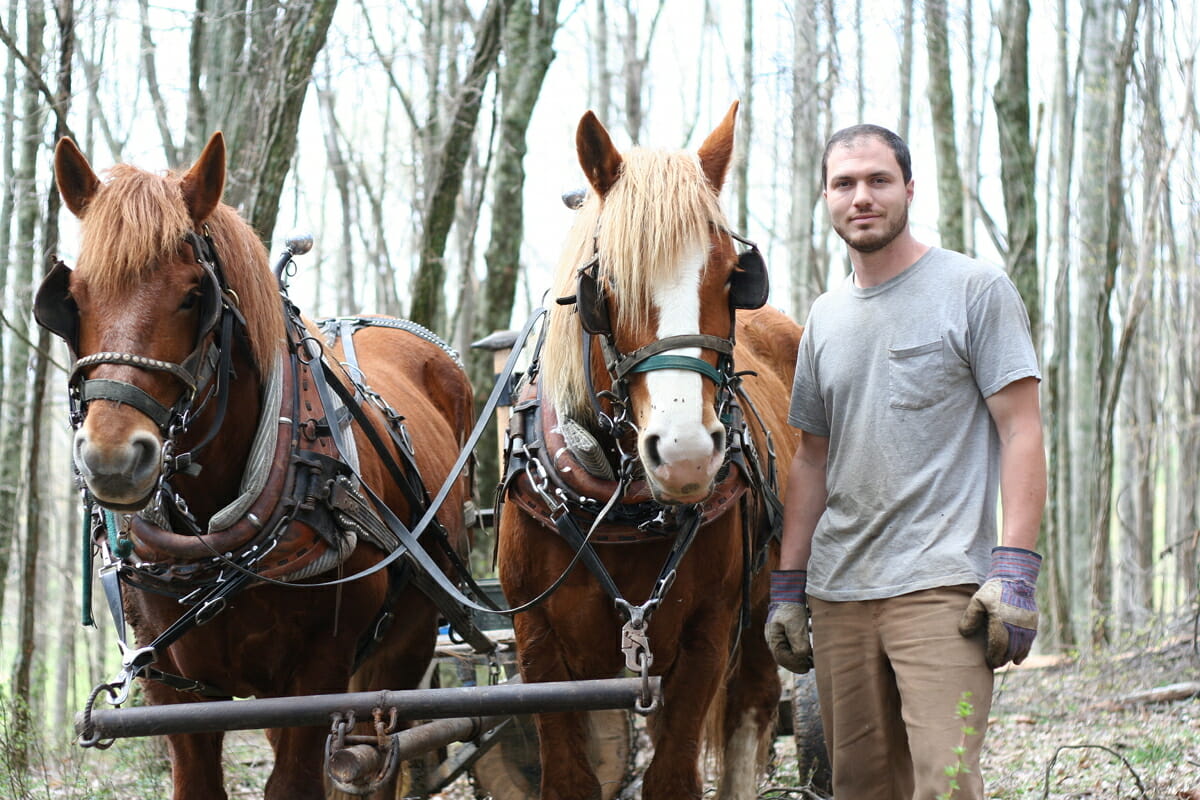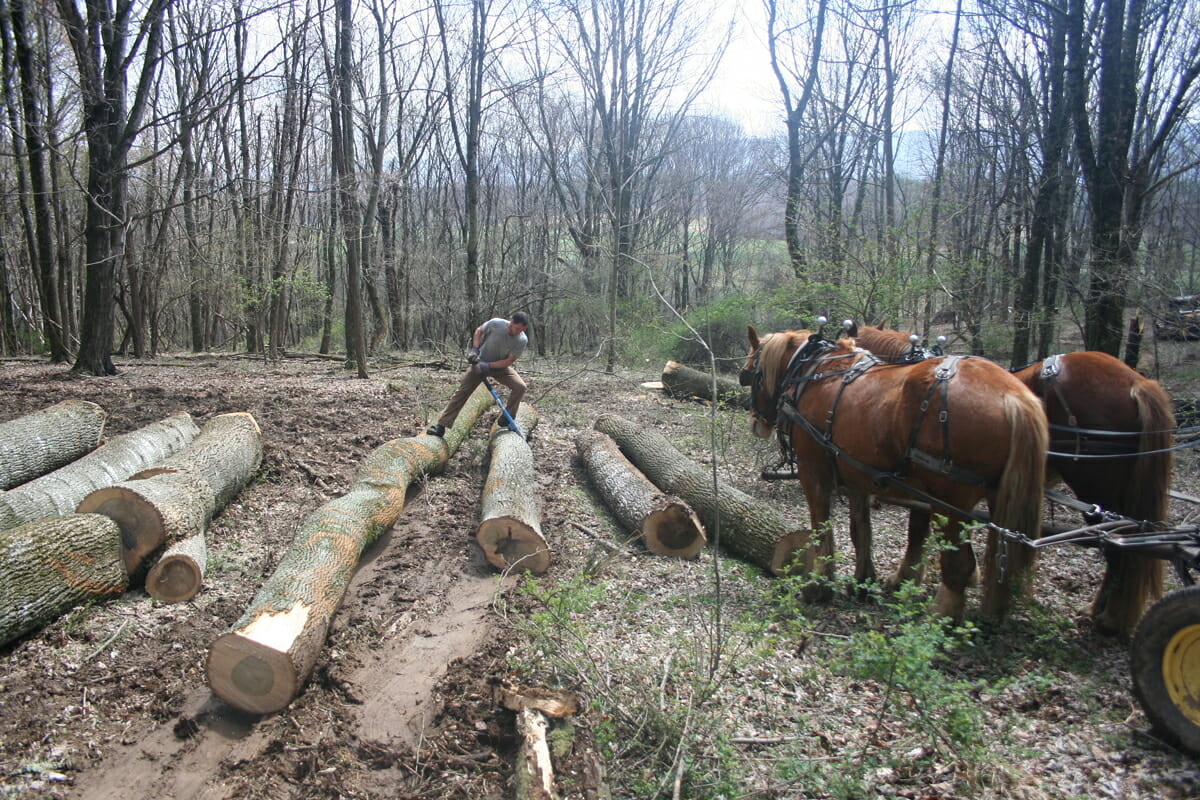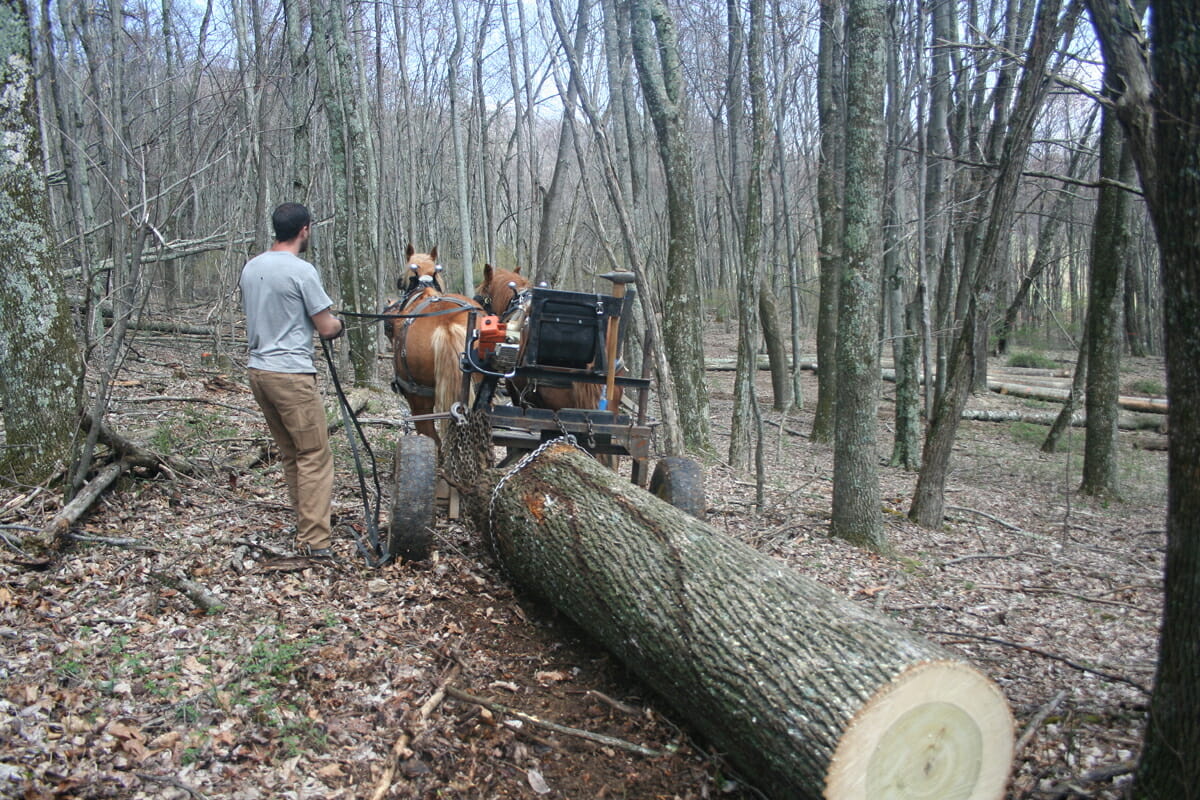Retro Farming: Horsepowered Logging
Ben Harris has been using horse teams to log Virginia forests since he was 18, and is part of a small group of loggers bringing renewed relevance to this old tradition.
Retro Farming: Horsepowered Logging
Ben Harris has been using horse teams to log Virginia forests since he was 18, and is part of a small group of loggers bringing renewed relevance to this old tradition.

The dynamics of the 21st century global marketplace can be found everywhere, even a remote mountainside in the far reaches of western Virginia, where Ben Harris and his crew are harvesting large tulip poplar logs in 10- and 12-foot pieces. Strong export demand means timber prices are good these days; after sawing and kilning elsewhere in Virginia, this wood will very likely end up in China, its eventual use unknown.
But while the Virginia hardwood’s fate is futuristic, its method of processing predates Chinese export demand by many centuries: draft horses. Harris, 29, has been using horse teams to log Virginia forests since he was 18, and is part of a small group of loggers bringing renewed relevance to this old tradition. While the horse logging industry consists of just a few dedicated fulltimers right now, the demand is such that the industry would welcome more.
Harris and colleagues use modern saws to cut down the wood and the horses’ main role is dragging felled logs from stump to the truck-loading site. As the owner Sinking Creek Horse Logging, Harris’s work schedule is booked solid for six to eight months, minimum. In part, that reflects forest owners’ growing desire to minimize the environmental and aesthetic impacts of conventional, diesel-powered logging.

“The horses don’t do as much damage as a skidder would do in the woods,” said Lou Woodall, the owner of the Craig County woodlot where Harris is working with his team of Suffolk Punches on this warm spring morning.
Economics also figures into growing demand for horse loggers like Harris. Privately-owned forest land in Virginia is becoming increasingly fragmented, causing the percentage of small tracts – 20 acres or less – to creep up over the past decade, according to the USDA. Hauling a bunch of modern logging machines to a job site is more expensive than pulling a horse trailer, and that higher overhead for conventional logging can make horse logging cost-competitive on small woodlots, even though it’s more labor intensive. The high price of fuel further bolsters the economic appeal of horse logging for forest landowners.

In any case, Harris said he’s making a solid living with the help of his Suffolk Punches.
“My favorite part would definitely be working with the horses,” said Harris, who grew up around horses and trains and works with his by communicating with them in their own subtle horse language (he is a fan of Monty Roberts,an original, real-life horse whisperer). He shares a special human-draft animal bond with them, based on a sense of fulfilled purpose. These horses were bred to work. On Monday mornings after an idle weekend in the pasture, they’re steppy, eager to put in some time, to spend a day pulling logs out of the woods. Horse logging is no anachronism; it is simply old, and like many other traditional farm technologies, increasingly back in style.
A previous version of this story stated that Ben Harris is a fan of horse whisperer Buck Brannaman, not Monty Roberts.
Follow us
This work is licensed under a Creative Commons Attribution-NoDerivatives 4.0 International License.
Want to republish a Modern Farmer story?
We are happy for Modern Farmer stories to be shared, and encourage you to republish our articles for your audience. When doing so, we ask that you follow these guidelines:
Please credit us and our writers
For the author byline, please use “Author Name, Modern Farmer.” At the top of our stories, if on the web, please include this text and link: “This story was originally published by Modern Farmer.”
Please make sure to include a link back to either our home page or the article URL.
At the bottom of the story, please include the following text:
“Modern Farmer is a nonprofit initiative dedicated to raising awareness and catalyzing action at the intersection of food, agriculture, and society. Read more at <link>Modern Farmer</link>.”
Use our widget
We’d like to be able to track our stories, so we ask that if you republish our content, you do so using our widget (located on the left hand side of the article). The HTML code has a built-in tracker that tells us the data and domain where the story was published, as well as view counts.
Check the image requirements
It’s your responsibility to confirm you're licensed to republish images in our articles. Some images, such as those from commercial providers, don't allow their images to be republished without permission or payment. Copyright terms are generally listed in the image caption and attribution. You are welcome to omit our images or substitute with your own. Charts and interactive graphics follow the same rules.
Don’t change too much. Or, ask us first.
Articles must be republished in their entirety. It’s okay to change references to time (“today” to “yesterday”) or location (“Iowa City, IA” to “here”). But please keep everything else the same.
If you feel strongly that a more material edit needs to be made, get in touch with us at [email protected]. We’re happy to discuss it with the original author, but we must have prior approval for changes before publication.
Special cases
Extracts. You may run the first few lines or paragraphs of the article and then say: “Read the full article at Modern Farmer” with a link back to the original article.
Quotes. You may quote authors provided you include a link back to the article URL.
Translations. These require writer approval. To inquire about translation of a Modern Farmer article, contact us at [email protected]
Signed consent / copyright release forms. These are not required, provided you are following these guidelines.
Print. Articles can be republished in print under these same rules, with the exception that you do not need to include the links.
Tag us
When sharing the story on social media, please tag us using the following: - Twitter (@ModFarm) - Facebook (@ModernFarmerMedia) - Instagram (@modfarm)
Use our content respectfully
Modern Farmer is a nonprofit and as such we share our content for free and in good faith in order to reach new audiences. Respectfully,
No selling ads against our stories. It’s okay to put our stories on pages with ads.
Don’t republish our material wholesale, or automatically; you need to select stories to be republished individually.
You have no rights to sell, license, syndicate, or otherwise represent yourself as the authorized owner of our material to any third parties. This means that you cannot actively publish or submit our work for syndication to third party platforms or apps like Apple News or Google News. We understand that publishers cannot fully control when certain third parties automatically summarize or crawl content from publishers’ own sites.
Keep in touch
We want to hear from you if you love Modern Farmer content, have a collaboration idea, or anything else to share. As a nonprofit outlet, we work in service of our community and are always open to comments, feedback, and ideas. Contact us at [email protected].by Andrew Jenner, Modern Farmer
May 1, 2013
Modern Farmer Weekly
Solutions Hub
Innovations, ideas and inspiration. Actionable solutions for a resilient food system.
ExploreExplore other topics
Share With Us
We want to hear from Modern Farmer readers who have thoughtful commentary, actionable solutions, or helpful ideas to share.
SubmitNecessary cookies are absolutely essential for the website to function properly. This category only includes cookies that ensures basic functionalities and security features of the website. These cookies do not store any personal information.
Any cookies that may not be particularly necessary for the website to function and are used specifically to collect user personal data via analytics, ads, other embedded contents are termed as non-necessary cookies.